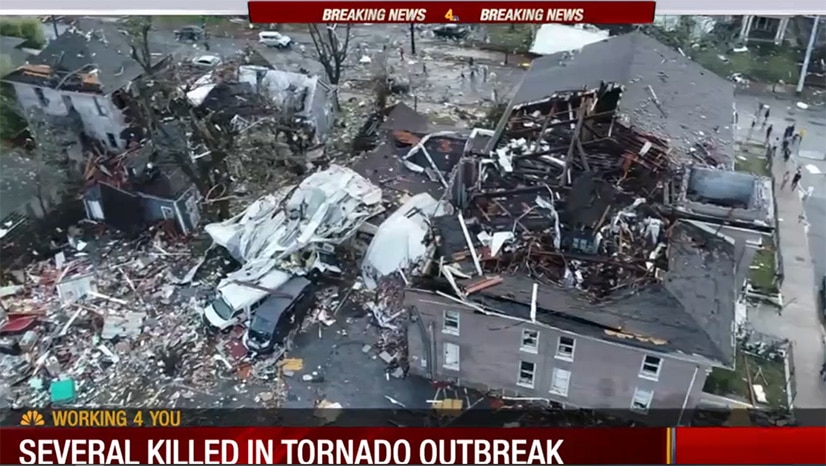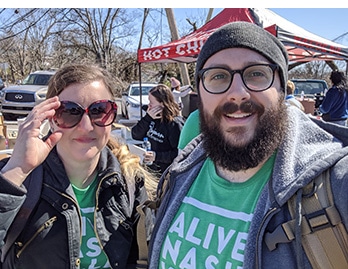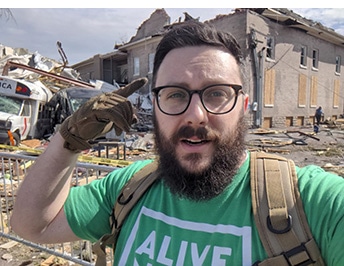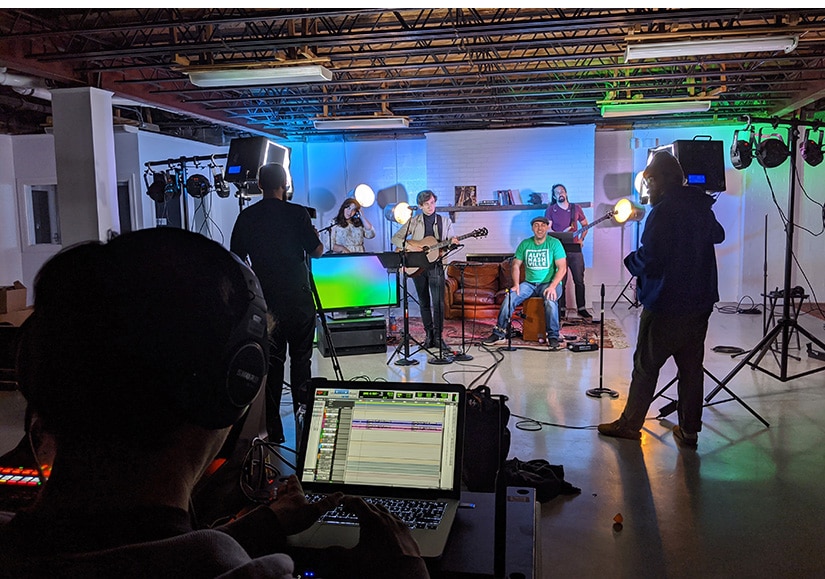By Jim Nieman
Just six months after the launch of Alive Nashville, an EF-3 tornado swept through East Nashville, Tenn., and destroyed the building where the church had been meeting. The tornado struck early on Tuesday, March 3, 2020, just over one year ago.
“Sara and I were at the Exponential church-planting conference in Orlando, and her parents were staying at our house in East Nashville with our two daughters,” recalled Brandon Jacobs, lead pastor of the Stadia church plant. “Sitting in our hotel room, our phones suddenly blew up with texts warning about the storms and potential for tornado. After we made sure our family was safe, we went to bed, thinking we were just being overly cautious.”
“The next morning we woke up to a hundred new texts, asking if we were OK. . . . I pulled up the local Nashville news and saw helicopter footage of our chapel building completely destroyed. . . . I was stunned.”
The church gathers in an area across the Cumberland River and about 2 miles from Downtown Nashville.
“I’ve seen disaster images before, but it was surreal to see places that I recognized as the sites of destruction, surrounded on the screen with red banners that said BREAKING NEWS and DISASTER and DEATH TOLL,” Jacobs said. “We checked in with our church people and confirmed that everyone was OK. Then we began making plans to return home immediately.”
In fact, two strong tornadoes swept through Tennessee that night. The Nashville-area tornado killed five people in three counties. A stronger tornado in Putnam County, east of Nashville, killed 19 people.
Brandon and Sara Jacobs are both originally from Nashville. After they graduated from Milligan University, “we moved around the South and Midwest pursuing ministry opportunities” for 12 years. They moved back to Nashville with their two young daughters, Julianna and Winter, in February 2018.
“We spent a year working with a local church helping launch a new campus, then in 2019, we began the prelaunch work for a new church.” On Sept. 29, 2019, Alive Nashville officially launched.
Christian Standard asked Brandon to share details about the immediate aftermath of the tornado, how Alive Nashville responded, and what life has been like during the past year.
Q & A
QUESTION: So, you and Sara were in Orlando, and a tornado swept through East Nashville—what happened next?
BRANDON JACOBS: Fortunately at Exponential we were surrounded by some of the best church leaders in the world. Stadia . . . introduced us to many great people and we had many great conversations. We spent the entire day with them all preparing to return home and lead through a tragedy. That night a church bought us plane tickets on the last flight out of Orlando. We arrived in Nashville very late and slept.
Early the next morning, about 24 hours after the tornado hit, we were at an impromptu meeting with several area churches and a relief organization from Church of the Highlands. Everyone was focused on coordinating supplies, but no one was on the ground in the affected areas coordinating volunteers and relief workers. An hour later, my wife and I were standing in the middle of rubble coordinating volunteers and relief workers.
Describe how that occurred.
When we first arrived [in the area near our church site], there were only volunteers muddling about in a disorganized way. There was no leadership in any sense—no police, no fire department, no National Guard, no relief organizations, nobody at all in charge. So Sara and I started organizing people. We had brought some supplies with us, and we texted our church members to bring more, and started handing out shovels, gloves, rakes, wheelbarrows, trash bags, anything we thought would be useful.
Then we started directing people to work together to start clearing things out. We began clearing streets of debris. Neighbors with chainsaws started coming up to us asking where they should go to help. We started sending scouts down different streets finding out what needed to be done and reporting back. An electric worker ran up to us and frantically shouted that a nearby downed power line was active . . . so we set up a makeshift barrier around it so nobody would venture close.
Eventually we set up some tables and canopies in a small cleared-out parking lot and used that as our operations hub. Restaurants came by and donated tons of food, so we added that to what we were handing out to volunteers and relief workers.
Over the next several days, we started organizing over social media. And Nashville showed up. We had hundreds and hundreds of volunteers. In one day we organized over 200 volunteers, and that was just our operation hub.
We also met people who were shell-shocked standing near what remained of their homes. . . . They saw the tornado, they felt it. Everyone had something incredible and horrifying to say. There were few deaths but a lot of close calls. And a lot of utter emptiness
Meanwhile, you had your church to consider.
Yes, in all of that I had to figure out what our church was going to do on Sunday, because we too were victims of this tragedy. There was an open-air pavilion a block over from what used to be our church building, and it was somehow untouched. Their owner let us meet there, and our tech team scrambled to get a basic speaker set and a TV. That Sunday we had the most beautiful church service I’ve ever experienced. Several new people who volunteered with cleanup or who lived nearby came. I spoke words of hope from the Bible. We prayed. We sang. Mostly we hugged and cried and laughed and just spent time talking. I don’t know how to describe it. It was a release.
Where has Alive Nashville been meeting since the tornado?
After that we scrambled to find a new location for church, and the day after we secured one, the mayor shut down all gatherings in Nashville. COVID-19 had arrived. We started filming church in my house, then found an old Methodist church nearby and cleared out a space in their basement to film. We did that for nine months, then finished renovations on the Methodist church basement and invited people to gather in person again in December. It ended up being the height of COVID, and Tennessee [was hit badly]. Many of our leaders kept being exposed and had to quarantine, and each Sunday the question came up if we had the leaders to do church. So we pivoted back to online. And now for Easter we’re finally once again inviting people to gather in person.
What have been some successes in the year since the tornado?
Our kids’ pastor created an interactive experience using activity bags and Zoom, and our kids’ ministry and families have been loving it. For many families it’s been a ray of sunshine while they were stuck at home for most of the pandemic. Also, livestreaming has unexpectedly given us the opportunity to reach far more people.
What have been some of the challenges?
Obviously, the pandemic and not being able to gather in person. Our church culture was based around sharing meals and meeting in homes. Keeping relationships and a sense of community has been a huge challenge. But also, with the tornado destroying our building and equipment, we were also sent back to square one of essentially have to start over again. Searching for a new location, figuring out new and different equipment for livestreaming. There’s been no “going back to normal” for Alive Nashville, because there’s no going back for us. So everything is up in the air. Everything is in question.
Has the church grown during the past year?
It’s hard to know. In some ways it has. Our kids’ ministry and the families we reach each Sunday has certainly grown. Our community groups were meeting in homes and having dinner, and Zoom hasn’t been able to quite replace that, so those haven’t grown, but we have started new deep-dive discipleship groups. As far as Sunday attendance, that hasn’t really grown as far as we can tell. This spring and summer though? Who knows . . .
Has IDES continued to partner with Alive Nashville during the past year?
IDES [International Disaster Emergency Service] has been tremendously helpful to us. Not only are they just wonderful people and encouraging to my wife and me personally, but they were some of the first to show up and help out. They’ve given all kinds of great guidance, supplies, and connected us with people and resources in our community and others nationwide.
I see there is a donations button at the church website. How much money has been raised and how has it been used?
We raised over $30,000 for tornado relief. It has blown me away how generous people were in the days after the tornado. We were able to be very agile in helping people. We put up families in hotels. We bought appliances and tires. We probably single-handedly kept Kroger afloat by buying people so many groceries. I can’t express to you how beautiful it’s been to just say yes to every need that we’ve come across, no matter how big or small.
Any other observations? Anything else you would like to say?
I know all churches and pastors have been hurting this past year. . . . What has propelled me forward has been a reminder that Jesus is King, and he calls us to come and die. That might mean come and fail, or come and struggle, or literally come and die. But what else can we do but be obedient and follow him? Whatever happens, we know he will use our faithfulness through our struggles, just as he used the blood of others who came before us, to tell his story and bring salvation to the world. So don’t give up. Never give up.
Jim Nieman serves as managing editor of Christian Standard.





Inspiring. God is good.